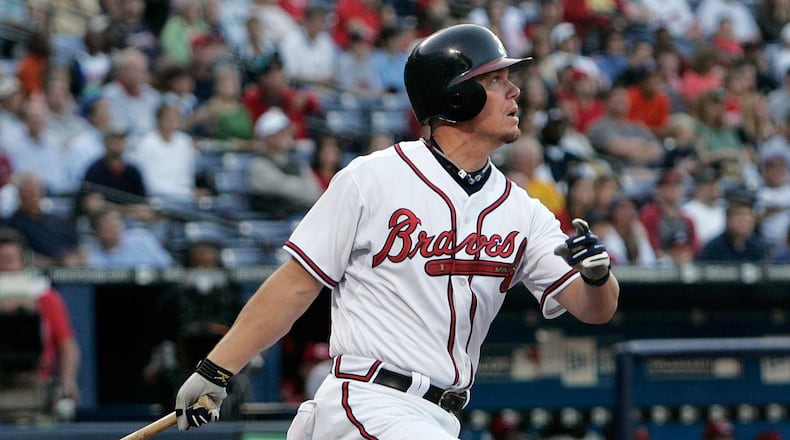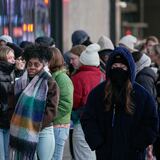Throughout a 19-year career spent entirely with the Braves, Chipper Jones did wondrous things that made baseball’s Hall of Fame appear an increasingly imminent career conclusion. But that didn’t lessen the grandness of the occasion Wednesday when he got the long-anticipated call from the Hall.
Jones was elected to the National Baseball Hall of Fame in his first year on the ballot, drawing an overwhelming 97.2-percent support from voting members of the Baseball Writers’ Association of America, who also elected Vladimir Guerrero, Jim Thome and Trevor Hoffman for the Class of 2018 to be inducted July 29 in Cooperstown, N.Y.
“I got that (area code) 212 call from New York, and my eyes got this big and everybody in the room just shut up,” Jones said. “I can’t describe it. It was one of those spine-tingling, chill-bump moments that you just can’t describe. It’s been an awe-inspiring day.”
The 2018 class also will include Alan Trammell and Jack Morris, who were elected in December by the Hall of Fame’s Modern Era committee.
Seventy-five percent is the threshold for election by the writers, and Jones’ percentage (officially 97.16) nearly matched the 97.2 percent that Greg Maddux got in 2014 as the highest ever for a former Brave and is the 11th-highest in history overall. The highest voting percentage for any former Brave was legendary slugger Hank Aaron’s 97.8 in 1982.
“I want to thank all the writers; it blows my mind that 97 percent of you guys voted for me,” said Jones, who was named on 410 of 422 ballots cast by writers. “I want to express my gratitude on this day, for giving a small-town kid an unbelievable dream of making it to the Hall of Fame.”
Former Expos and Angels outfielder Guerrero (92.9 percent) and Thome (89.8 percent), who hit 612 home runs with six teams, also easily made it, Guerrero in his second year on the ballot and Thome in his first. Hoffman, whose 601 saves included 552 in 16 seasons with the Padres, was on 89.9 percent of ballots in his third year.
Jones is the sixth Brave from the team’s greatest era to be elected to the Hall of Fame in a five-year span, joining pitchers John Smoltz, Tom Glavine and Maddux, their longtime manager Bobby Cox and former general manager John Schuerholz.
All played integral roles in the team’s unprecedented 14 consecutive division titles through 2005, with Jones manning third base and batting third for the vast majority of games during the final 11 years of that run after helping the Braves win the 1995 World Series as a rookie.
“I can’t tell you what a pleasure it was to play behind those three pitchers,” Jones said. “It was a pleasure to come to work knowing we had an opportunity to win each and every night they took the mound. I’m grateful to John Schuerholz and Bobby Cox every year for giving us a chance coming into spring training to achieve our ultimate goal. ...
“For us to have our own little fraternity up there in a little piece of heaven in Cooperstown, New York, is something we can and should be very proud of because we did an awful lot of winning during the ’90s and early 2000s down here in Atlanta.”
Along with his wife, children, agent and a few others, Jones had his parents at his home in Milton when the call came from the Hall of Fame.
“Having my mother and father here at the house, it was waterworks when I got off that phone call,” he said. “Only thing I could say to my dad when I hugged him was, ‘We did it.’ I mean, this has been 35, 36 years in the making. To have it culminate today with all the people I love and care about the most here to share it with me was pretty awesome.”
Longtime former teammate Andruw Jones, a 10-time Gold Glove winner and another cornerstone of that Braves era, was named on just 7.3 percent of ballots in his first year of Hall of Fame eligibility, narrowly surviving the five-percent minimum required to remain on the ballot for future consideration.
Fred McGriff, who hit 130 of his 493 career homers as a Brave and helped Atlanta to its 1995 World Series championship, again received a surprisingly low 23.2 percent of votes in his ninth and next-to-last year on the ballot.
Chipper Jones, regarded as one of the greatest switch-hitters along with Mickey Mantle and Eddie Murray, hit 468 home runs and finished with a .303 average, .401 OBP and .529 slugging percentage in 19 seasons, making him the lone switch-hitter and only third baseman with a “slash line” of at least .300/.400/.500 in 7,500 or more plate appearances. He was an eight-time All-Star and the 1999 National League MVP.
Jones, 45, is one of nine players in major league history to hit at least 400 homers and have at least a .300 average, .400 OBP and .500 slugging percentage, a rarefied group with Babe Ruth, Lou Gehrig, Ted Williams, Stan Musial, Jimmie Foxx, Mel Ott, Frank Thomas and Manny Ramirez
The highest Hall of Fame voting percentage in history was Ken Griffey Jr.’s 99.32 percent (437 of 440 ballots) in 2016, which broke Tom Seaver’s record of 98.84 percent in 1992. Four others were named on at least 98 percent of the ballots: Nolan Ryan (98.79 percent) in 1999, Cal Ripken Jr. (98.53) in 2007, Ty Cobb (98.23) in 1936 and George Brett (98.19) in 1999.
Jones had 1,055 extra-base hits, 1,623 RBIs, and more walks (1,512) than strikeouts (1,409) in his Braves career, never striking out 100 times in a season. He hit .300 or better 10 times, had at least 20 home runs in nine consecutive seasons through 2008, drove in at least 100 runs in nine seasons, and scored at least 100 runs in eight.
“How lucky we all were as Braves fans, and all baseball fans for that matter, to see Chipper Jones play,” said former Braves superstar Dale Murphy, who won consecutive NL MVP awards in 1982-83. “We all could tell that he was unique and had elite-level baseball talent. I think we could see that being inducted into baseball’s Hall of Fame was inevitable. Truly one of the best of the best.”
The first overall pick of the 1996 draft out of The Bolles School in Jacksonville, Fla., Jones was the Braves’ Golden Boy and became a face of the franchise for baseball’s team of the ’90s. He was an Atlanta sports icon whose performance, good looks and self-assured demeanor contributed to first-name fame that stretched throughout the Southeast and well beyond the Mason-Dixon Line.
In New York, Chipper was “Chippuh!” – often preceded by an expletive.
Jones played another seven productive years after the Braves’ glory days, getting National League MVP votes in four of his final seven seasons, winning an NL batting title by hitting .364 (with a 1.044 OPS) at age 36 in 2008, and coming back from major knee surgery in 2010 to make the All-Star team each of his final two seasons in 2011 and 2012 before retiring at 40.
He received MVP votes in 13 seasons including six top-10 finishes. He got 29 of 32 first-place votes when he won the MVP award in 1999, after batting .319 with a career-high 45 home runs, including 24 homers in 70 games after the All-Star break as the Braves pulled away from the Mets for the division title. They beat the Mets again in the NL Championship Series before losing to the Yankees in the World Series.
In 12 postseasons, Jones hit .287 with 13 homers and a .409 OBP in 93 postseason games, including six league championship series and three World Series.
After getting four plate appearances in a 1993 September call-up, Jones missed the 1994 season after tearing up a knee at spring training, pushing back his highly anticipated rookie season to 1995. And what an auspicious season that would be for Jones, who hit 23 home runs and was the NL Rookie of the Year runner-up (behind 26-year-old Hideo Nomo) for a Braves team that swept Cincinnati in the NLCS and beat Cleveland in a six-game World Series.
That was the first professional-sports championship for Atlanta and remains the city’s only major pro-sports title. The Braves lost in their only subsequent trips to the World Series in 1996 and 1999, both times against the Yankees and once (1996) after winning the first two games of the series at New York.
Jones said just last week that winning only one World Series during the Braves’ run of division titles still bothered him and his teammates.
“But it doesn’t take away from how proud I am of what we accomplished as an organization while we were here,” he said. “I think everybody will tell you in most of my 19 years that eventually you had to come to Atlanta if you wanted to represent the National League in the World Series. And I take even more pride in knowing that most of those teams knew they had to get me out in order to be successful. So, it’s a tremendous sense of pride in what we accomplished here.”
After his last trip to the World Series in 1999, the Braves lost in seven of the last eight division series Jones played, and he hit two homers in a three-game series against Houston for their lone postseason series win in that span. His only other postseason game after 2005 was a wild-card playoff loss to St. Louis.
But Jones kept plugging away despite the disappointing team finishes and what became chronic knee problems. After a season-ending torn ACL in his left knee in August 2010 – the second ACL tear of his career – many speculated that Jones had played his final game. He quickly quashed that notion, saying he wasn’t going out like that.
He returned the following spring and, despite consistent and considerable aches in his creaky knees, Jones .280 with 32 homers and an .823 OPS in 238 games over his final two seasons, making the All-Star team each of those years.
About the Author



